|
|
|
Sort Order |
|
|
|
Items / Page
|
|
|
|
|
|
|
| Srl | Item |
| 1 |
ID:
125267
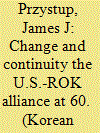

|
|
|
|
|
| Publication |
2013.
|
| Summary/Abstract |
It is important to recognize how successful the U.S.-ROK Alliance has been for the past sixty years in deterring North Korea from attempting to unify the Korean Peninsula by force. This paper addresses Korea's unique status and examines its strong presence in meeting commitments to the international community. The future will require alliance-based cooperation with international partners to address challenges posed by the proliferation of WMD, which is one among many. In the end, however, the U.S.-ROK Alliance will only grow stronger, enhancing stability and security on the Peninsula.
|
|
|
|
|
|
|
|
|
|
|
|
|
|
|
|
| 2 |
ID:
125260
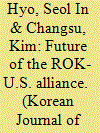

|
|
|
|
|
| Publication |
2013.
|
| Summary/Abstract |
Over the past six decades, the alliance between the Republic of Korea and the United States has become one of the most successful military alliances in history. Numerous strategic changes are anticipated in Northeast Asia over the coming years, including the risk of a military attack by North Korea and a shift in the balance of power. Among multiple factors that contribute to the success of an alliance, one key factor is sharing a common vision of the future since sharing this is crucial to enhance the trust shared today and to reinforce the alliance's capability to respond effectively to any new challenges that may arise. This paper seeks to offer a vision for the ROK-U.S. alliance and make suggestions on how the alliance can develop and improve in the future by trying to forecast changes in the security circumstances surrounding the Korean Peninsula and Northeast Asia until around 2030. As a result, this paper finds the fact that maintaining the ROK-U.S. alliance is the optimal choice for both countries until 2030, despite the various strategic changes in Northeast Asia, including a possible national reunification of the Korean Peninsula and presents a long-term vision for the ROK-U.S. alliance based on this fact and some implementation strategies for this vision.
|
|
|
|
|
|
|
|
|
|
|
|
|
|
|
|
| 3 |
ID:
125249
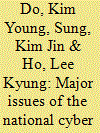

|
|
|
|
|
| Publication |
2013.
|
| Summary/Abstract |
the national cyber security system (NCSS) of South Korea came under criticism when North Korean cyber terrorist attacked the office computers and servers of major south Korean broadcasting and financial companies on March 20, 2013. The NCSS had evolved up to that time by addressing problems, that arose from incidents dating to the January 25, 2003, internet crisis, the March 4, 2011 distributed denial of service (DDoS) crisis, and other event occurring between those attacks. The above 2013 cyber terrorism incident magnified the limits of NCSS leadership, expertise and collaborative systems, while revealing that past reform were nothing more than stopgap measures.
|
|
|
|
|
|
|
|
|
|
|
|
|
|
|
|
| 4 |
ID:
125252
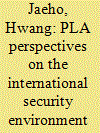

|
|
|
|
|
| Publication |
2013.
|
| Summary/Abstract |
Since 2010, there has been much concern about whether China is becoming too hardline in its foreign behavior. As the focus of China's rise has moved from economic and diplomatic dimensions to a military one, the main concern is whether the voice of the military will directly apply to China's foreign policy. As a result, research on the People's Liberation Army (PLA) has become a priority. Then, what kind of perspective does the PLA have in regards to China's foreign policy? Is it influencing foreign policy in reality? By investigating the PLA's perceptions in its external security environment and its role within the country's
foreign policy-making process, this paper plans to obtain a better understanding of the military's influence on China's foreign policy. This paper is based on interviews with six PLA senior officers, two active major generals, two reserve major generals and two active senior colonels, which were conducted in July 2011 after the China threat expanded in 2010. The conclusion is that the PLA does not have the most influence to dictate China's foreign policy, although it is an important pillar of power in the current Chinese regime.
|
|
|
|
|
|
|
|
|
|
|
|
|
|
|
|
| 5 |
ID:
125255
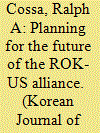

|
|
|
|
|
| Publication |
2013.
|
| Summary/Abstract |
Although it is hard to predict how and when the Korean Peninsula will finally become reunited, there is no doubt that the best means to ensure peace on the Korean Peninsula is through maintaining a strong ROK-U.S. alliance, both today and after reunification. A new approach with a midterm goal of peaceful coexistence is needed to keep Pyongyang positively engaged and to set the stage for eventual
Reunification and denuclearization. While Washington may take the lead in dealing with the nuclear issue, Seoul must take the lead in Korean Peninsula reunification. The U.S. and ROK must agree upon and then jointly articulate their respective roles and missions and begin making the case today for a role for the alliance post-reunification. For the denuclearization and the non-proliferation message to be kept firm, maintaining a strong ROK-U.S. alliance is critically essential.
|
|
|
|
|
|
|
|
|
|
|
|
|
|
|
|
| 6 |
ID:
125253
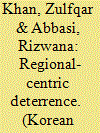

|
|
|
|
|
| Publication |
2013.
|
| Summary/Abstract |
It is generally believed that a stable nuclear deterrence averts wars between nuclear adversaries, and makes peace secure. This conceptual argument has merit in terms of the prevention of all-out war; but it does not fully address the need to prevent the outbreak of a limited war between two nuclear weapon states. India and Pakistan have already fought one limited war, Kargil, in a nuclear environment. These two relatively new nuclear weapon states rely on nuclear deterrence to address the external threats. While frequently occurring conflicts demonstrate this, a recurrence of limited war cannot be ruled out in this crisis-ridden region, which would be fraught with significant dangers of escalation. Using a qualitative research approach and deploying a structural deterrence theory as a conceptual guiding tool, this paper investigates the nuclear future of the region, including the prospects of war, conflict termination strategy, escalation control, escalation dominance mechanisms, and finally suggests some pertinent lessons for crisis stability.
|
|
|
|
|
|
|
|
|
|
|
|
|
|
|
|
| 7 |
ID:
125264
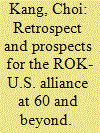

|
|
|
|
|
| Publication |
2013.
|
| Summary/Abstract |
The year 2013 marks the 60th anniversary of the ROK-U.S. alliance. The catchphrase "We go together," which is used in the ROK/U.S. Combined Forces Command (CFC), well captures its founding spirit. Since the beginning of the alliance, with the signing of the ROK-U.S. Mutual Defense Treaty in 1953, it has been a key element in both countries' security strategies. Both have agreed to upgrade the alliance to "strategic alliance." To realize a strategic alliance, clear guidelines that go beyond simple rhetoric must be adopted and an action plan devised through intense discussions. For that purpose, it is essential for South Korea and the United States to undergo a bottom-up review process of the alliance. It is important to pay careful attention to: identification of challenges the two must cope with together (for what); the division of labor (who should do what); plans and strategy (how); and cooperation mechanisms (through what). Along these lines, it is important to think about how to enrich the contents of military cooperation as the backbone of the alliance. To avoid any misunderstanding and over-expectations of the United States, South Korea must make it clear what it can and cannot do on the basis of undiminished mutual respect.
|
|
|
|
|
|
|
|
|
|
|
|
|
|
|
|
| 8 |
ID:
125250
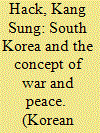

|
|
|
|
|
| Publication |
2013.
|
| Summary/Abstract |
does Confucianism account for any part of the perceptions of international politics that Korean possess? if it does, then how significant has its influence been on the historical process of the conceptual formation of Korean's concepts of war and peace? first learned over two millennia ago, Confucianism finally become the sole ruling ideology under the Joseon Dynasty. Ever since, Confucian virtues moralistic approach, education of men, and family like international order with the middle kingdom at the centre, among many played dominant roles in Korean domestic politics as well as it foreign relations (Sino-Korea relations, almost exclusively). what seemed to last forever in East Asia, however confronted a massive challenge an the fate of Koreans was not exception. Korea's bandwagoing strategy within the Confucian world order could not function nay more with the advent of the age of imperialism and the subsequent foreign penetrations.
|
|
|
|
|
|
|
|
|
|
|
|
|
|
|
|
| 9 |
ID:
125254
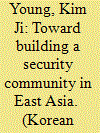

|
|
|
|
|
| Publication |
2013.
|
| Summary/Abstract |
Despite the high-level economic interdependence and cultural exchange among major regional actors, the current security environment of Northeast Asia is rather volatile. The tension surrounding North Korean military aggression, the Taiwan Strait, and the East/South China Sea indicates the necessity of a security mechanism that restrains the aggressive actions of the regional actors involved. One viable option is to build a security community within which member states share an expectation of settling their differences through peaceful means. Based on an examination of the current state of security cooperation among South Korea, China, and Japan, this paper argues that the main impediment to a sustainable regional security community has been identity conflict caused by the history disputes among the three countries, not the lack of institutional settings or U.S. support. Shared identity and the concomitant mutual trust are prerequisites for genuine security cooperation. Therefore, this paper suggests the reconciliation process between South Korea and Japan as the initial step toward building an East Asian security community, paying attention to its implications for South Korea-China- Japan reconciliation.
|
|
|
|
|
|
|
|
|
|
|
|
|
|
|
|
|
|
|
|
|